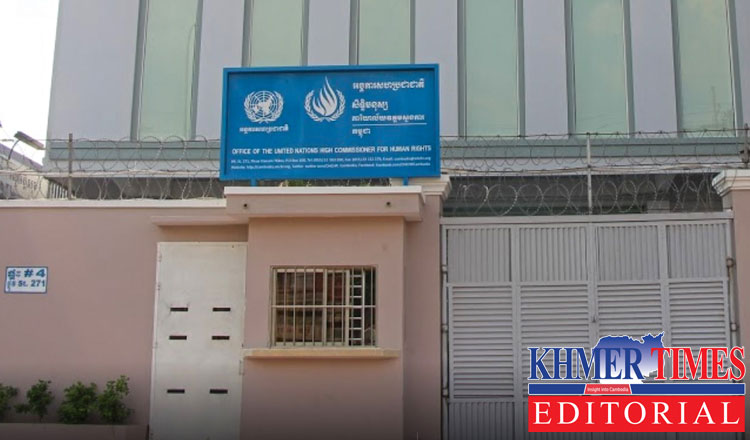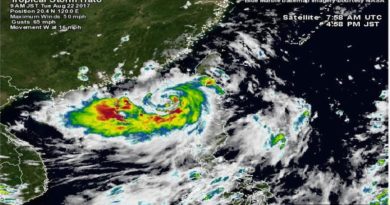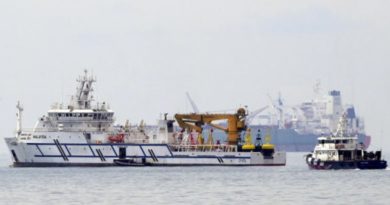OP ED EDITORIAL: Cambodia should close down United Nations Human Right Office by 2030

Cambodia should close down the Country Office of the Office of the High Commissioner for Human Rights (OHCHR) and end the mandate of the Special Rapporteur on the situation of human rights in Cambodia by 2030 or earlier. And the international community should support that. Here are the reasons why, along with pre-conditions for the closedown.
OHCHR and Special Rapporteur were established since 1993. OHCHR Cambodia’s Country Office is the oldest field office in the world, and the only country office in Asia. This has been regarded as a positive sign of how much Cambodia and the United Nations have been closely cooperating in the promotion and protection of human rights.
That is the positive side.

But on the negative side, one would wonder that after nearly 30 years of presence, Cambodia still does not have enough capacity to monitor human rights situation on its own? After nearly 30 years, Cambodia still does not have institutional capacity to promote and protect fundamental human rights that are clearly prescribed in Cambodian Constitution? After nearly 30 years, the United Nations still fails to conduct knowledge transfer to Cambodia?

This is a shameful fact for both Cambodia and the UN.
From the beginning, these mechanisms were put in place to monitor human rights situation in the country, to ensure that every Cambodian citizen would be able to voice out their rights when they are being violated and abused, especially those who are marginalised, vulnerable or socially too weak to protect themselves. The role of the Special Rapporteur includes technical assistance especially in terms of institutional mechanism to help Cambodia properly adhere to its international obligations.
Despite having many official mechanisms to promote and protect human rights, it is very unfortunate that Cambodian people still choose unofficial or ad-hoc channels to lodge their protest.
For instance, people tend to report human rights abuses to human rights NGOs, to Radio Free Asia (RFA), to Voice of America (VOA) instead of the government channels. It is also an indication of the government’s weakness when the government creates ad-hoc mechanism such as Prime Minister’s Facebook messenger, and/or volunteer lawyers for the weak, etc., to receive people’s complaints, when the actual complaints should have been made to, for example, the offices of Damnang Reastr (or parliamentarians), the Court, local government offices, and the Cambodian Human Rights Committee (CHRC).

This means that citizens lack trust on the official institutions to lodge their complaints and to receive protection of their rights or justice.
So, if Cambodia and the UN want to close down the human rights office and the Special Rapporteur’s mandate, both sides need to address the above challenges by strengthening the existing official mechanisms to earn trust from the people. And we should not blame people for going to RFA, VOA, or human rights NGOs, or even writing to the Prime Minister’s Facebook page and messenger. It is simply because they don’t know where to report their problems.
The first and most important step is to ensure that reporting mechanisms should be accessible for all citizens, including those who do not know how to read or write, without fear of revenge or backlashes.
The second step is to ensure that their lawful complaints are being addressed to earn trust from the people. Not everything needs to go all the way to the Prime Minister to decide and find solutions.
Basically, the reporting mechanism should be in the executive body, who are the closest to the implementation process and to the people.
If the abuse is allegedly done by the government institutions and officials, as a matter of check-and-balance, the legislative body and the court should be the next important mechanism for reporting. People should know their Damnang Reastr’ offices well and these offices should have convenient accesses for everyone while protecting the confidentiality of the complaints.
The Cambodian Human Rights Committee (CHRC) should also be integrated as a unit in the National Assembly to ensure its independence from the government, to have more check-and-balance power, and to conduct an objective report on the government’s performance in regards to international obligations in the protection and promotion of human rights under the Cambodian Constitution.
The role of NGOs is also important to fill the gap of information on human rights abuses as they work at the grassroot level. They should maintain their role as the eyes and ears for the people, which is also beneficial for the government because the national level government cannot fully monitor all local actions at the grassroot level. Otherwise, there is no need for the national level government to create the Jos Moula-Tharn (or visiting local constituencies) mechanism.
NGOs should be one of the facilitators of complaints and should function as pro-bono legal offices to make sure that people who has limited knowledge can lodge complaints through existing legal mechanism. Therefore, these NGOs should be supported by real professional lawyers, not activists nor politicians. They should act as pro-bono lawyers to support weak people, but they should not act as the judge or prosecutor. They have no such authority. They should work with national institutions to get the problems solved, and not reporting to or relying on foreign funders to find local solutions. They should also be transparent before the law.
OHCHR and Special Rapporteur should assist Cambodia in achieving the above goals of institutional building to ensure ownership and independence through well-planned and targeted technical assistance. They should not find ways to eternally secure their political existence, which means the perpetuation of Cambodia’s lack of capacity and ownership.
The UN bodies should share the same goals with Cambodia and should release their manpower and experts from Cambodia to look after war torn or post-conflict countries, whose human rights situations demand more of their attentions and expertise.
Foreign counterparts should also share the same goals with Cambodia in closing the Human Rights office and ending the mandate of the Special Rapporteur by 2030 if they truly have genuine intention to support Cambodia’s self-reliance and ownership. They should use their taxpayers’ money wisely to support countries that desperately need them the most in terms of human rights protection and promotion especially those countries in conflict zones or those with internal strife, violence, atrocities and internally displaced persons.
.











